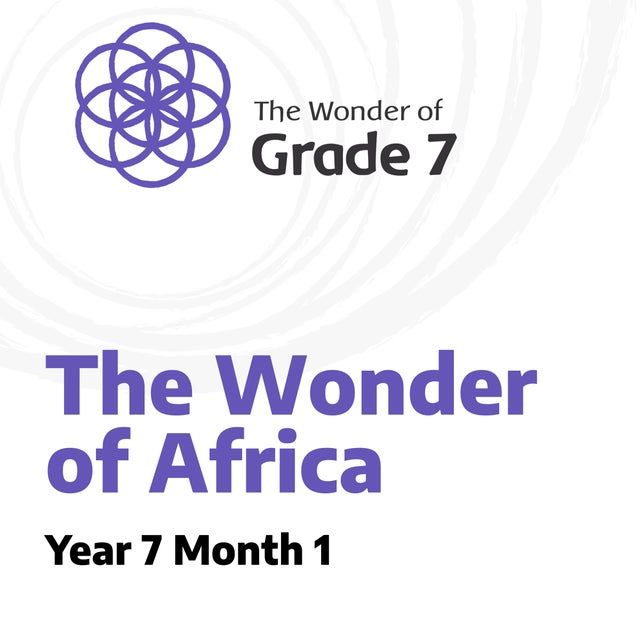- Unit Studies
- >
- Grade 7
- >
- Grade 7 Month 1 The Wonder of Africa
Grade 7 Month 1 The Wonder of Africa
SKU:
g7m1
CA$44.00
CA$44.00
Unavailable
per item
Students will explore this vast continent both geographically and historically. Wonder will be awakened through story and artistic endeavour.
This purchase is for 1 month of curriculum and includes access to our members-only area with supporting documents, videos, resources and community.
Curriculum Areas/Learning Outcomes
Language Arts: Concept: Exploring stories and other texts helps us understand ourselves and make connections to others and to the world.
Connection: Through the story, your child will recognize and identify the role of personal, social, and cultural contexts, values, and perspectives.
Concept: Questioning what we hear, read, and view contributes to our ability to be educated and engaged citizens.
Connection - Your child is taking the time to consider the values of indigenous living and how they compare to the ancient civilizations that arose in Africa.
Concept: Developing our understanding of how language works allows us to use it purposefully.
Connection: Your child is developing their ability to summarize their learning into concise written paragraphs.
Social Studies: Concept: Geographic conditions shaped the emergence of civilizations.
Connection: Through exploring and studying the map of Africa, understanding the importance of the Nile River, as well as other geographical features, your child can see why civilizations emerged around these life-giving sources.
Concept: Economic specialization and trade networks can lead to conflict and cooperation between societies.
Connection: Your child is learning about the natural resources that led to economic trade routes through the sub-Saharan, and the relationship that developed between Muslims and Africans in the Empire of Ghana.
Concept: Increasingly complex societies required new systems of laws and government.
Connection: With the stories and information about the fight for independence in African countries throughout the continent, your child can come to see the challenges the African people face in creating their own governments.
Concept: Religious and cultural practices that emerged during this period have endured and continue to influence people.
Connection: Many of the indigenous tribes of Africa are still present today and have maintained ancient cultural and religious practices.
Math: Concept: Decimals, fractions, and percentages are used to represent and describe parts and wholes of numbers.
Connection: Have your child work on these portions of the Grade 7 math workbook, as review practice.
Science: Concept: Earth and its climate have changed over geological time.
Connection - Through looking at the history and geography of Africa, your child is gaining an understanding of this concept. The ancient civilizations who settled by the Niger river, experienced a very different climate and land conditions than we see there today.
Connection: Through the story, your child will recognize and identify the role of personal, social, and cultural contexts, values, and perspectives.
Concept: Questioning what we hear, read, and view contributes to our ability to be educated and engaged citizens.
Connection - Your child is taking the time to consider the values of indigenous living and how they compare to the ancient civilizations that arose in Africa.
Concept: Developing our understanding of how language works allows us to use it purposefully.
Connection: Your child is developing their ability to summarize their learning into concise written paragraphs.
Social Studies: Concept: Geographic conditions shaped the emergence of civilizations.
Connection: Through exploring and studying the map of Africa, understanding the importance of the Nile River, as well as other geographical features, your child can see why civilizations emerged around these life-giving sources.
Concept: Economic specialization and trade networks can lead to conflict and cooperation between societies.
Connection: Your child is learning about the natural resources that led to economic trade routes through the sub-Saharan, and the relationship that developed between Muslims and Africans in the Empire of Ghana.
Concept: Increasingly complex societies required new systems of laws and government.
Connection: With the stories and information about the fight for independence in African countries throughout the continent, your child can come to see the challenges the African people face in creating their own governments.
Concept: Religious and cultural practices that emerged during this period have endured and continue to influence people.
Connection: Many of the indigenous tribes of Africa are still present today and have maintained ancient cultural and religious practices.
Math: Concept: Decimals, fractions, and percentages are used to represent and describe parts and wholes of numbers.
Connection: Have your child work on these portions of the Grade 7 math workbook, as review practice.
Science: Concept: Earth and its climate have changed over geological time.
Connection - Through looking at the history and geography of Africa, your child is gaining an understanding of this concept. The ancient civilizations who settled by the Niger river, experienced a very different climate and land conditions than we see there today.
Curriculum Overview
This study of the Wonder of Africa is an effort to present the rich history of Africa to your child. Of course, Africa is a huge continent with a very diverse history, so it is impossible to bring the full history of all the various regions in the time we have. This means that Daily Wonder has chosen highlights throughout the history of the continent to serve as examples of what was taking place throughout Africa at various points in history. Please feel free to add an additional region for your child’s study, if you feel called to do so.
Please Note:
The Wonder of the Animal World is brought in Year 4, and this brings focus to the animals of the continent of Africa. There is not a study of animals in this unit. If you feel called to add some time in for animal study, please go ahead!
The specific study of Nelson Mandela and South Africa will be included in the Year 7 unit Wish, Wonder and Surprise.
And finally, your child will study The Wonder of European History: The Age of Exploration and Exploitation this year. This will fill out the study of European colonialism, and its effect on Africa.
Please Note:
The Wonder of the Animal World is brought in Year 4, and this brings focus to the animals of the continent of Africa. There is not a study of animals in this unit. If you feel called to add some time in for animal study, please go ahead!
The specific study of Nelson Mandela and South Africa will be included in the Year 7 unit Wish, Wonder and Surprise.
And finally, your child will study The Wonder of European History: The Age of Exploration and Exploitation this year. This will fill out the study of European colonialism, and its effect on Africa.

